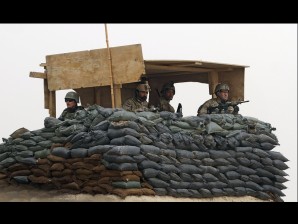Experts: Soldier might have post-traumatic stress

In this Sunday, March 11, 2012 file photo, U.S. Army and Afghan soldiers are seen in a guard tower at their base in Panjwai, Kandahar province south of Kabul, Afghanistan, following the alleged killing of 16 civilians by a U.S. soldier. U.S. investigators have determined that the suspect had been drinking alcohol prior to leaving the base the night of the attack, a senior U.S. defense official said Friday. (AP Photo/Allauddin Khan, File)
The questions are already being debated: Did the U.S. soldier suspected of killing 16 Afghan villagers have post-traumatic stress disorder, or PTSD? And did the people who sent him back to war after he was injured properly determine he was mentally fit to return?
It’s too soon to dissect the state of mind of the 38-year-old longtime soldier accused in the killings, whom a senior U.S. official identified on Friday as Army Staff Sgt. Robert Bales. The official spoke on condition of anonymity because of the sensitivity of the investigation into the killings.
However, several mental health experts said PTSD is a reasonable thing to consider.
The soldier’s lawyer said his client had seen a fellow soldier’s leg blown off a day before the killings last weekend, and had suffered a head injury and lost part of a foot during three earlier deployments to Iraq. The soldier left for Afghanistan in December.
“This kind of a person would fit the profile for someone who might well have PTSD,” said Dr. Roger Pitman, a Harvard Medical School psychiatrist who heads the PTSD Research Laboratory at Massachusetts General Hospital.
He has no knowledge of the case and spoke hypothetically, but said that if the soldier had recently witnessed a major injury to a comrade, it could have been an important trigger.
“A psychologically traumatic event in which a person feels intensively helpless or terrified may result in a post-traumatic disorder,” Pitman said. “We’ve known ever since the Vietnam war that the unfortunate phenomenon of abusive violence often closely follows the injury or death of a buddy in combat. The injury or death of a buddy creates a kind of a blind rage.”
On Friday, a senior U.S. defense official said that investigators have determined that the suspect had been drinking alcohol before he left the base the night of the killings. How much of a role alcohol may have played in the attack is still under investigation, said the official, speaking on condition of anonymity because charges had not yet been filed.
The lawyer, John Henry Browne, said the soldier’s family had told him that the soldier saw a friend lose his leg — an account that has not been independently verified. Browne also said that while in Iraq, the soldier had suffered a concussion in a vehicle accident caused by an improvised explosive device and had to have part of one foot removed after suffering a battle-related injury. The military has not released details of those injuries, the cause of the accident or exactly when the 11-year veteran was hurt.
Browne said the soldier was screened for the head injury before he was sent to Afghanistan. He said he did not know if his client had PTSD, but said it could be an issue at trial if relevant.
During a visit to the soldier’s home base Friday, Gen. David Rodriguez, head of U.S. Army Forces Command, said there was “sufficient screening” for PTSD at Joint Base Lewis-McChord in Washington state. The command is responsible for training and preparing soldiers for battle.
He also defended how the Army handles the stress of multiple deployments. Browne has said his client had been training as a military recruiter and did not want to go to Afghanistan.
“There’s not a cookie-cutter solution. There’s no rule that says, ‘This guy can handle two or three,'” Rodriguez said. “But we pay attention to that very, very carefully.”
Troy Holbrook, a San Diego scientist who has researched PTSD as a consultant for the military, said the soldier’s own injuries put him at risk for PTSD. Like Pitman, she has no direct knowledge of the soldier’s case.
“The rates of PTSD post-combat in the military run in some studies everywhere from 15 or 18 percent all the way to 30 percent,” Holbrook said.
However, “only a small minority of people with post-traumatic stress disorder engage in abusive violence,” Pitman said.
Dr. Gregory O’Shanick, a psychiatrist and former medical director for the advocacy group Brain Injury Association of America, said the same is generally true of people with concussions, which can damage impulse-control regions of the brain.
“Traumatic brain injury of any severity is not strongly linked to aggressive behavior,” he said.
U.S. officials have said the Army staff sergeant was trained as a sniper.
“To be a sniper, you’ve got to have the ultimate in impulse control. You have to move slowly, you have to inhibit, you have to wait … to put the brakes on even in situations where the heart is pounding and it’s a high-stress environment,” O’Shanick said. To be chosen for such a role, he must have been able to control impulses better than the average person, O’Shanick said.
In prisons, there is a high percentage of inmates with traumatic brain injuries, he added. That usually doesn’t make them more aggressive, but “when it goes bad, it can go bad significantly,” he said.
AP writers Robert Burns in Washington and Mike Baker in Olympia, Washington, contributed to this report.














